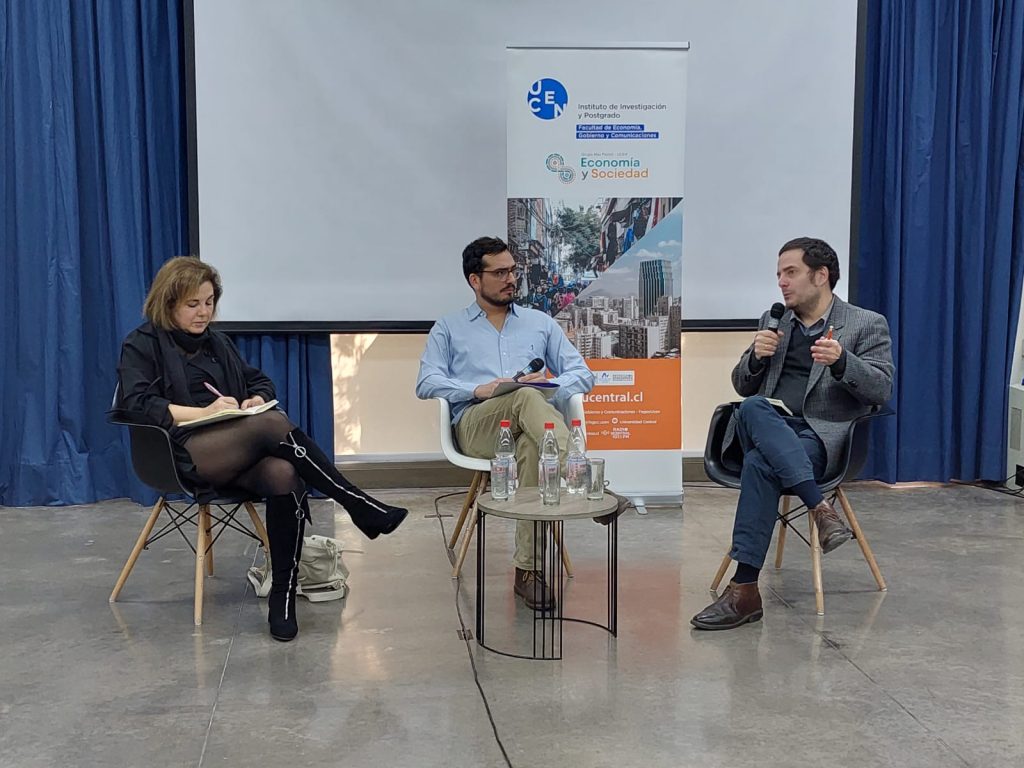Launching of the first Interdisciplinary Research Nucleus in Gender Studies led by ESOC members

Today was the official launching of the first Interdisciplinary Research Nucleus in Gender Studies at the Central University, which will be directed by researchers from the Faculty of Economics, Government and Communications and its Max Planck Research Group in Economics and Society. “Gender autonomies: employability, migrations and youth” (NIAG) is the name of the initiative that will be led by Dr. Paz Concha, Dr. Neida Colmenares will be deputy director of the space, while Dr. Gabriela Zapata will be one of the researchers, all three members of our faculty. Dr. Marcela Betancourt, who is part of the Faculty of Social Sciences of the Universidad de Chile, also joins the core group. Dr. Concha explained that the objectives of the lines of research and a road map for the next two years have already been defined. “As a nucleus we have proposed an active work, in the first instance academic, which is to develop a collaborative and interdisciplinary research space that is of excellence and that borders the subjects of the challenge in gender and sexogenic autonomy in the themes that we have defined, employability, migrations and youth,” he commented. He added that the aim is also to “form a collaborative network between academics and academics from different faculties, that is, to be able to work collaboratively together, and once the lines of research have been established in a second year, to generate an information network with a general cross-cutting information course on the general perspective of the university (…) With the aim of creating a legacy that our research work can leave behind”. She also mentioned that “we want to think of autonomy in a more comprehensive way, as a condition that allows us to overcome the elements of gender subordination in which we now find ourselves, and with respect to the lines of work, we have this one”. The initiative will have three lines of work: the first will focus on the study of employability and its relationship with gender economic autonomies, such as the labor insertion of women in the post-pandemic scenario; the second will be centered on migrations and will seek to analyze the institutional conditions that favor and hinder the labor insertion processes of migrant and refugee women in Chile; while the third will observe the field of youth with the purpose of revealing the counter-hegemonic conceptions linked to the experiential meanings of the concept of youth.
The Academic Year of the Instituto de Investigación y Postgrado FEGOC was inaugurated with an interesting discussion on the challenges of the Chilean right wing.

In recent months, the political environment has changed: the defeat of Apruebo in last year’s constitutional plebiscite gave way not only to a new constituent process, but to a political scenario that once again leaves the right wing, especially the extreme right wing, as a relevant actor.after its defeat in both the 2020 referendum and the 2021 presidential election. It is in this context that challenges for the right wing and the paths it will take after the results of the election of constitutional councilors a few weeks ago are also born. This topic was the focus of the discussion that took place today as part of the inauguration of the Academic Year of the Master’s degree programs of the Research and Postgraduate Institute of the School of Economics, Government and Communications. The activity, which was moderated by Political Science academic Sebastián Rumie, counted with the participation of two outstanding researchers: Stéphanie Alenda, lecturer at the Universidad Andrés Bello and editor of the book “Anatomía de la derecha chilena: Estado, mercado y valores en tiempos de cambio” (Anatomy of the Chilean right wing: State, market and values in times of change), and Hugo Herrera, Professor at the Universidad Diego Portales and author of the book “La derecha en la crisis del bicentenario”. “This is one activity to kick off another which is the development of our magisterial program on different participations. It is done, I would say, with something that is very demonstrative of what the university should be, which is an instance of reflection,” said Dean Luis Riveros, who also pointed out that “the university should be an instance of reflection,” he said.Each one of us will have our own truth, but we will have the opportunity to contrast them in this space”, Challenges and future The conversation delved into several topics about the Chilean right wing, especially the relevance that the Republican Party is having. “Let’s remember that in the election where Piñera won, the presidential election not so long ago, José Antonio Kast got around 8% of the electorate, then in the election that followed he got around 44% in the second round, and in the third round he got around 44%. Now we have seen that the Republicans have 41.5% of this entire constitutional council, why is that?” commented Professor Sebastian Rumie. “One factor, I believe, was the discursive performance of the Frente Amplio, of the new left that comes with a more youthful, contentious discourse than the realism to which we were accustomed to democratic socialism. (…) And together with this, a certain irresponsibility regarding issues that are ugly, but which are state issues such as the rules of the economy, employment, security, are tasks that cannot be left aside, and this was added to the performance of the constituent convention where very radical speeches were made”, said the academic Hugo Herrera. Researcher Stéphanie Alenda also pointed out the role of the more moderate right wing, hand in hand with Chile Vamos in a scenario of competition not only with the ruling party, but also with the Republicans. In this line, he said that “as the government’s performance worsens, of course the Republicans have more possibilities to grow (…) Chile Vamos can always compete by showing off, toughening its discourse on issues such as order, security, etc., but He is also much more committed to certain issues that go in the direction of these great social transformations that Chile has known”.
Article on consumer credit and class identity was published in the indexed journal Finance and Society.

The research conducted by ESOC’s director, Felipe González, was accepted and published in early May in the indexed journal Finance and Society, edited by academics from the universities of London, Edinburgh and Heidelberg. “Debt for status? Consumer credit, ordinary consumption, and the sense of place”, is titled the paper written by the also director of the Research and Graduate Institute of the School of Economics, Government and Communications UCEN, which explored the interaction between consumerism, lending, and class identity in the context of the factors that drive the demand for credit. The study, which used 26 semi-structured interviews in its methodology, made two main findings: first, it suggests that people borrow not only to obtain prestige, but also to affirm their sense of belonging to symbolic groups. Second, in contrast to the idea that loans are mainly used for conspicuous consumption, the article points out that middle-class families in Chile use them to consume “ordinary” products. Thus, through this type of consumption, the middle class seeks to stabilize its class identity. The findings, the research indicates, address the normalization of credit and borrowing practices along with the conversion of products from a “want” to a “need.” This is a view that has been overlooked in the analysis of the dynamics driving this type of demand, which translates into a missing link in the explanations for the rise in household debts.
Keynote lecture “The Circuit of Detachment in Chile. Understanding the Fate of a Neoliberal Laboratory”.

In the framework of the International Workshop organized by the Max PLanck-UCEN Group for Research in Economics and Society, “Understanding the Trap: Broken promises, neoliberal resilience and social fatigue in market societies”, we invite you to attend the following workshop Kathya Araujo’s keynote talk entitled “The Circuit of Detachment in Chile. Understanding the Fate of a Neoliberal Laboratory”. Professor Araujo is a researcher at the Interuniversity Multidisciplinary Nucleus for Research on Individuals, Social Ties and Power Asymmetries(NIUMAP) and a full professor at the Institute for Advanced Studies (IDEA) of the University of Santiago de Chile. Information: Friday, April 21, 11:30 am. Room 67, Campus Vicente Kovacevic II, Santa Isabel 1278. Talk in English. Registration here.
International Workshop: “Understanding the Trap: Broken promises, neoliberal resilience and social fatigue in market societies”.

With the aim of exploring how the relationship between unfulfilled promises of neoliberalism and its mechanisms of resistance to change produce a situation of anomie and social fatigue, the first international workshop of the Max Planck-UCEN Group for Research in Economics and Society will be held on April 20 and 21. The event will bring together ESOC academics with four researchers from the Max Planck Institute for the Study of Societies, Cologne, Germany, as well as prominent Chilean researchers. Information: April 20 and 21 (9:00 am). Santa Isabel 1278, Building VKII, Room 67. Limited registration, here. Check the program here: Kick-off workshop Santiago 2023
Presentation of the book “Identity Investments. Middle-class Responses to Precarious Privilege in Neoliberal Chile” (Stanford University Press).

The Max Planck Research Group in Economics and Society UCEN, of the Faculty of Economics, Government and Communications of the Universidad Central de Chile, is pleased to invite you to the presentation of the book “Identity Investments. Middle-class Responses to Precarious Privilege in Neoliberal Chile”. (Stanford University Press), by Joel Stillerman. Information: Thursday, April 20, 5:00 p.m., Auditorium 2, Campus Vicente Kovacevic II, Santa Isabel 1278. Registration here. Language: Spanish
Launching of the Max Planck-UCEN Group and Inauguration of the “UCEN Chair of Economics and Society”.

The Faculty of Economics, Government and Communications is pleased to invite you to the launching of the Max Planck-UCEN Research Group in Economics and Society. The event includes the inauguration of the UCEN Chair in Economics and Society (April 19, 17:00hrs). The opening event will be officiated by a public reading, with simultaneous translation, by Jens Beckert, director of the Max Planck Institute and Leibniz Prize in Social Sciences. Information: Wednesday, April 19, 17:00 hrs. Santa Isabel 1278, VKII Building, Carlos Blim Auditorium. Registration here. The Max Planck-UCEN Group for Research in Economics and Society is housed at the Faculty of Economics, Government and Communications of the Universidad Central de Chile (ESOC-UCEN). It focuses on the study of the social, political and cultural foundations of the economy, and specifically addresses socioeconomic processes that arise at the intersection of economy and society, such as economic action, market formation, transformations in capitalist relations, economic and political governance, continuity, change and crisis of neoliberalism, state-market relations, and distributive conflicts that arise in democratic capitalism, among others. The research developed by the ESOC-UCEN group is approached from an interdisciplinary perspective, which translates into cooperation, convergence and careful combination of knowledge from multiple disciplines and methodologies. ESOC-UCEN’s academic staff includes people with backgrounds in agronomy, anthropology, economics, urban studies and sociology.
Andrés Silva to speak at a conference in the U.S. on global trade in food consumption

Discussing the effect of international trade on domestic food consumption will be one of the focuses of the session to be presented by researcher Andrés Silva at the Agricultural and Applied Economics Association (AAEA) Annual Meeting in Washington DC. The annual conference, to be held in July, brings together close to 1,000 attendees, including academics and graduate students. Faculty from Harper Adams University in the United Kingdom, Texas A&M University, Rabobank and the Economic Research Service of the US Department of Agriculture in the United States will also participate. https://www.aaea.org/meetings/2023-aaea-annual-meeting
Carl Johan Lagerkvist to visit Chile and talk with ESOC researchers about publishing articles

Sharing experiences in the publication of academic articles in a “Meet the Editor” session will be one of the activities in which Professor Carl Johan Lagerkvist, who will visit Chile between March 6 and 10 at the invitation of the Interdisciplinary Center for Research in Economics and Society (ESOC) of the Faculty of Economics, Government and Communications of the Universidad Central, will participate. In addition, he will participate in a meeting co-organized with the Ministry of the Environment to discuss advances in research related to environmental labeling, composting and food waste. If you are interested in participating in face-to-face or remote activities, please contact Andrés Silva. Carl Johan Lagerkvist Professor of Business Economics Swedish University of Agricultural Sciences Publisher European Review of Agricultural Economics https://www.slu.se/en/ew-cv/carl-johan-lagerkvist/


 600 582 2222
600 582 2222  admision@ucentral.cl
admision@ucentral.cl